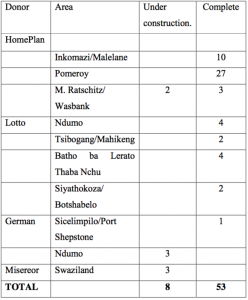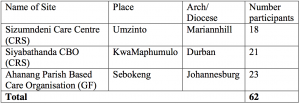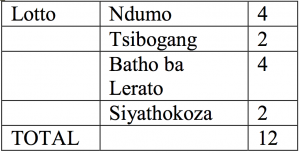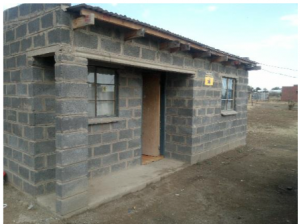
SACBC AIDS Office Report, December 2014
Sr Alison Munro
Antiretroviral (ART) Programme
- The ART programme of the SACBC AIDS Office was considerably down-scaled during 2014, and the patients of a number of sites transferred to Department of Health clinics. The Centres for Disease Control (CDC) approved a No Cost Extension to the programme for an additional year to May 2015 for two sites, Nazareth House in Johannesburg and Tapologo in Rustenburg.
- At the request of the National Department of Health, an evaluation of the impact of the services of both facilities, and the satellite clinics in the case of Tapologo, was conducted by Strategic Evaluation, Advisory and Development Consulting (SEAD). The SEAD evaluation also assessed the impact of the work of the Department of Health clinics in the relevant catchment areas. SEAD has recommended that both the Catholic facilities continue beyond the end of PEPFAR funding with Department of Health support. Final decisions in this regard are awaited from the relevant Provincial Departments of Health.
- “Transitions” to Department of Health clinics of SACBC patients elsewhere proceeded relatively smoothly, having been long anticipated and prepared for. Blessed Gerard in Mandini, Diocese of Eshowe, has continued in a public private partnership, with the Provincial Department of Health supporting drugs and laboratory services, and private funding supporting staff and facility costs.
- PEPFAR marked ten years of support to South Africa. Filming was done at a number of the places where its support had been marked. For the SACBC these sites included Nazareth House, Johannesburg, and Newcastle.
- New PEPFAR funding is for technical assistance to the Department of Health, helping it strengthen delivery of services in local clinics, strengthening Supply Chain Management of drugs, and providing for effective monitoring and evaluation systems to track the numbers of patients on treatment across the country. The SACBC AIDS Office is not a recipient of a technical assistance grant.
- The SACBC AIDS Office was invited by AJAN, the African Jesuit AIDS Network, to participate in a study on ART in Africa, part of an advocacy campaign to improve access to ART across the continent.
PEPFAR Orphan and Vulnerable Children’s Programme
- The OVC programme received a No Cost Extension for an additional year to May 2015, after which there will be no funding from PEPFAR for the 25 projects spread across the various provinces.
- The Department of Family Medicine at the University of Pretoria is conducting an assessment of a number of sites in the programme due to be completed by the end of January 2015. The assessment is examining impact, reach, services rendered, socio- economic environment, and perceptions of how the programmes support the work of the Church to address AIDS.
- Various training workshops for the projects have been conducted regionally, and have included Education for Life, Proposal writing, and Good Governance.
- The Centres for Disease Control (CDC) under which the grant falls is conducting assessments at each of the OVC sites, regarding the particular activities expected and the documentation to be maintained. For a number of sites there is a challenge in this regard.
- Alternative funding for the whole programme is not possible. The SACBC AIDS Office hopes to access some funding to support some of the sites, and some of the sites themselves have been able to source additional funding from other sources to support their work. These funding sources are both South African (for the sites that are registered as Non Profit Organisations), and international (often Church-related).
TB Screening
- The TB screening programme supported by the British government (DFID) and the National Department of Health has done good work in both South Africa and Swaziland. Because of the strong British currency in relation to the South African Rand, the SACBC AIDS Office was able to add in additional sites, above those originally agreed on. The programme screens people for TB, and ensures follow up testing and treatment where recommended. People are also counselled and tested for HIV, with follow up where called for.
- A grant end evaluation of the project is being conducted through the School of Nursing of the University of the Free State, with some of the field work having been conducted by Dr Ruth Stark, formerly Country Director of Catholic Relief Services in South Africa. The final research report is expected by the end of January 2015.
- The DFID programme will not be funded after March 2015.
The Global Fund (GF) Home Based Care and Orphan and Vulnerable Children’sProgramme
- The SACBC AIDS Office is a sub-recipient of funding from the National Association for Social Development (NRASD) of a Global Fund grant, covering work in both home based care, and orphan and vulnerable children’s support.
- Currently an extensive evaluation of the programme by CASE is underway. It is expected that all the SACBC GF sites will be visited, as well as those of all the other sub recipients.
- The SACBC AIDS Office has experienced funding challenges in respect of the Global Fund grant, but it hoped that going forward funding will be received timeously.
- There have been a number of challenges also in respect of Monitoring and Evaluation (M & E), and it is hoped that moving forward these will have all been settled in view of the fact that the sites will be expected in the course of 2015 to have their data captured on the new CBIMS system of the Department of Social Development. This system aims to capture data of all children in the country provided with services.
- The National Association of Child Care Workers (NACCW) is conducting extensive accredited training for selected care workers from GF sites. The training will be concluded in 2015.
Orphan Housing
- Homeplan has been the main funder of two-roomed houses for child-headed and grandmother-headed households in rural areas, with some funding also from the National Lottery, and from a number of private German donors.
- Homeplan donors made two “building trips” to Pomeroy in the Diocese of Dundee to assist in the construction of some of the houses.
- Cycling for Pomeroy was another initiative of the Homeplan donors. A group of cyclists cycled from Pomeroy in KZN to Nairobi, Kenya to raise funding to continue the programme. Johan Viljoen of the SACBC AIDS Office participated in the trip.
- Misereor is supporting the training of orphaned youth and the construction of some houses in Swaziland.
Other Programmes
- A Catholic Relief Services (CRS) programme supported 4 four OVC sites in Swaziland and South Africa. Catholic Relief Services has partnered the SACBC AIDS Office since 2000 though the nature of its support has changed over the years. A small grant will continue in 2015 though CRS will no longer have an office in South Africa.
- A Lotto grant supported OVC sites in four districts of South Africa, providing food, clothing and shelter.
- A legacy received through Christian Aid has supported some Church projects in Gauteng, especially in the Johannesburg area. Some have received a once-off grant for a particular need, others are receiving regular monthly support.
Retreats, Conferences, Training, Publications
- Retreats for staff and caregivers in most of the projects were conducted during the year. These were found to be beneficial for all concerned, those who bear the brunt of responding to situations related to AIDS at grassroots level.
- A number of retreats were supported by funding from Mensen met een Missie which has pledged further support for 2015. An anonymous donor has funded training for spiritual directors and retreat givers who work with caregivers to enhance their pastoral skills, and follow up retreats to mentor the trainees. The programme is underway and will continue in 2015.
- The Symposium of the Episcopal Conferences of Africa and Madagascar (SECAM) was mandated to produce a training manual for the Church in Africa on AIDS and Church responses. The first training, and the beginning of the dissemination of the training manual, was hosted by the SACBC AIDS Office near Johannesburg in November for people representing Anglophone Africa. In 2015 the training will be done for both Francophone and Lusophone countries by SECAM.
- Sr Alison Munro presented a paper at a colloquium held in Nairobi on “The Church we want”, a follow up to the Second African Synod. She participated in a conference organised by Caritas International and UNAIDS in Rome, examining the importance of the Church’s response to AIDS globally, and the need for ongoing efforts to address AIDS. She was also part of the study day on the Church’s response to AIDS of the International Commission for Church Affairs of the German Bishops. Conference, meeting in Cologne, Germany.
- In preparation for the extraordinary Synod on the Family in Rome Sr Alison submitted a paper to INTAMS at the University of Louven on the response of the SACBC region to the preparatory questionnaire on the family. Her paper on the response of grassroots women to AIDS will be included in a new book by the African
Jesuit AIDS Network (AJAN) on theological and pastoral responses to AIDS in Africa, due in 2015. - The SACBC AIDS Office book, Catholic Responses to AIDS in Southern Africa,edited by Fr Stuart Bate (of St Joseph’s Theological Institute) and Sr Alison Munro, was launched in Manzini during the plenary session of the SACBC and the during the centenary celebrations of the Church in Swaziland.
APPENDIX 1
TB Program: Johan Viljoen
- Highlights: The program uses community health workers in implementation sites to screen clients for TB, take sputum samples of those suspected of having TB, have the samples tested, enrol those who test positive on TB treatment, monitor those on TB treatment for adherence, counsel and test clients for HIV, enrol those who test positive on ART and monitor them for adherence. The program is currently funded by DFID and the National Department of Health.
- Major Achievements: TB is the major cause of death of HIV positive people in both South Africa and Swaziland. There is anecdotal evidence that the program is resulting in a decrease in morbidity due to TB in its implementation sites. The Priest formerly in Charge at Regina Mundi in Swaziland reports that the number of funerals conducted in the parish decreased to less than a quarter of the number experienced previouslyafter this program was initiated there. He attributes this solely to the fact that people with TB are now accessing treatment in time.
- Geographical Locations: The program is implemented in the Dioceses of Dundee (Madadeni, Pomeroy, Maria Ratschitz), Aliwal North (Joe Qwabi and Sterkspruit), Queenstown (Ntaba Maria Clinic), Port Elizabeth (Caring Ministry and King Williams Town), Kroonstad (Virginia, Viljoenskroon, Maokeng), Durban (Estcourt and Elandskop), Manzini (Piggs Peak and Siteki), Rustenburg (Chaneng), Tzaneen (Mokgolobotha, Mothupa and St Joseph’s Sibasa) and Keimoes/Upington (Bisdom Vigsministerie).
- Statistics: The combined statistics (for all sites and for both funders) for the period January – October 2014 are as follows:Health workers trained in TB and in HIV Counselling and Testing: 200 Clients screened for TB: 161 959
Clients initiated on TB treatment: 6 789
Clients counselled for HIV: 65 301Clients tested for HIV: 27 446
Clients initiated on antiretroviral treatment: 3 360
- NSP: “Accelerated Case Finding of TB” is one of the NSP’s top priorities. In this regard, the SACBC AIDS Office TB program fully supports the NSP.
- Beneficiaries: TB screening and HIV testing is done from house to house. All residents of target communities are beneficiaries. Most communities where the program is implemented are poor, rural communities with high HIV infection rates and high unemployment figures.
APPENDIX 2
ART Program: Theresa Bossert
This is a time of final transition of direct services by church to Government. The transition looks different at different sites, but overall the transition steps are to transfer patients to Department of Health facilities, transfer assets and where possible program staff to be absorbed by either Department of Health or Department of Health partners giving technical support going forward.SACBC AIDS Office has successfully transitioned 4 sites since January 2014 (Siyathokoza in Botshabelo; Kurisanani in Tzaneen Diocese; Blessed Gerard and Newcastle, both in KZN). Two parkhomes (at Newcastle and Siyathokoza) and clinical equipment were transferred for continued use by the Department of Health. No staff has been absorbed at any of the DoH sites.The 2 remaining SACBC ART projects (Tapologo and Nazareth House), are both being considered to become DoH supported sites by North West and Gauteng provinces respectively. This came about after SACBC commissioned SEAD, at the request of the DoH, to evaluate SACBC clinics and surrounding DoH clinics to establish the impact the transition will have on the welfare of the patients.Tapologo has a signed MOA and been receiving their drug supply from DoH since December 2013, and has been using NHLS (National Heath Laboratory Services) for blood tests since 1 September 2014. Nazareth House has signed an MOA with the DoH very recently and is waiting for drugs and lab support to come into place. Nazareth house had meetings with Gauteng DoH and future Department funding looks fairly promising.Our patients all over the country are very grateful to SACBC and PEPFAR for the last 10 years of support and they wish for us to continue; many patients fear a transition to DoH due to a lack of confidence in the Government’s ability to treat them. The love and care that the church clinics give will long still be remembered.
APPENDIX 3
Fleiszer Legacy Program: Theresa Bossert
During 2014 SACBC AIDS Office received finding through Christian Aid from the Fleiszer Legacy to assist orphans and vulnerable children, and the poor, in and around the Johannesburg area.
We were able to assist 10 Sites with once off funding to improve or repair infrastructure, and to procure some needed vehicles, furniture and equipment. Six of the ten organisations also received funding to contribute to their monthly running costs. In September Gui Carvahlo from Christian Aid visited three of the sites, Nazareth house, Missionaries of Charity Yeoville and St Francis, and was pleased that the money was being put to good use.
The sites which benefitted from this year’s Fleiszer funding were from:
- Tshwane District: The Missionaries of Charity in Klipgat: Holy Cross Sisters project called Emmanuel Place of Hope crèche in Plastic View; Sizanani Children’s Home in Bronkhorstspruit and the Good Shepherd sisters with education centres in Madidi, Mmakaunyane and Hebron.
- In Ekhuruleni we supported St Francis Care Centre’s Rainbow cottage in Boksburg; Little Eden in Edenvale and KIDS Community College in Ivory Park.
- Under the City of Johannesburg Metro we have Missionaries of Charity and Nazareth House in Yeoville, and The Love of Christ Ministries in Eikenhof.
The sites are caring on average for the following number of children:
Many of the beneficiaries are orphans and vulnerable children from areas that are impoverished and have high population densities, high HIV prevalence with very few economic opportunities. Some areas are inhabited by economic migrants and refugees. Many of our beneficiaries were abandoned babies brought to a place of safety by the Police or Social workers. Some of these facilities take care of children (and some adults) suffering from serious mental and physical disabilities.
APPENDIX 4
Global Fund Program: Nondumiso Jwara
- Overall aims and objectives of the programme: To reach 828 patients with Home Based Care services, with a special focus on ART Adherence Support and 1080 OVC with child and youth care services in priority districts identified by the Global Fund within the 5 inland provinces of South Africa.
- Where it has operated. Limpopo: Modjadjiskloof; Phalaborwa. Mpumalanga: Hazyview and Leandra. Gauteng: Sebokeng.
- Training, retreats, campaigns, events : 38 Home Based Caregivers were trained by David Patient and Niel Orr of Leopard Tree Retreat in HIV and Positive Living; Modjadjiskloof(9), Phalaborwa(9), Ahanang (10) and Vezokuhle(10).40 OVC caregivers were trained by NACCW on Basic Fundamentals of Child and Youth Care. 9 are pursuing the full qualification of Child and Youth Care through NACCW. These OVC sites benefited: Tiyimiseleni; Ekuthuleni; Vezokuhle and Ahanang. Caregivers have to do practicals with children and their families at the sites to finish their accreditation requirements. Caregivers at Ahanang; Ekuthuleni; Modjadjiskloof and Vezokuhle attended healing retreats between April and May 2014.
- Major achievements and challenges. 38 HBC caregivers were deployed. These Care Givers were deployed at Ahanang (10); Phalaborwa (10); Modjadjiskloof (9); Vezokuhle (9). 38 ART Adherence support groups at all 4 HBC sites.
40 OVC Care Givers were deployed. Ahanang at 10 caregivers and 12 caregivers at both Ekuthuleni and Tiyimiseleni. Vezokuhle had 6 OVC caregivers. OVCs received food plates; food parcels; school uniforms; household goods as well as intangible services such as counselling; homework assistance; referrals, etc. 308 children were counselled and tested for HIV across the four sites. - How the programme addresses the goals of the NSP:
a. Preventing new HIV and TB infections through HCT for youth and
Symptomatic Pulmonary TB screening.b. Sustaining health and wellness through support groups for clients on ART and for Caregivers
c. Ensuring protection of human rights and improving access to care through all the services offered to beneficiaries at the various sites. - Key Statistics
38 HBC Caregivers reaching 884 clients
40 OVC caregivers reaching 1345 children
4 HCT counsellors counselled and tested 308 OVC across the four OVC sites 308 OVC symptomatically screened for pulmonary TB
38 ART Adherence Support groups formed and operational
APPENDIX 5
CRS Programme: Nondumiso Jwara
This report covers the work done between 01 January and 31 September 2014. The sites funded through this grant (receiving monthly tranches) were Good Shepherd (Manzini); Christ the King Parish HBC Unit (Manzini); Polokwane Diocese Welfare and Development (Polokwane); Ikhaya Community Development (Durban); Siyabathanda CBO (Durban); Sizumndeni Care Centre (Mariannhill) and Sithembele Awareness Program (Mthatha). The School Uniforms; TB training; Gardening training; MVC Shelter renovations and Winter blankets projects were the main focus during this period.
- Gardening training: 38 people received gardening training, which was given to all the sites supported through the CRS programme. Theory was covered in class and there was good participation for the practicals, which included: Double digging; Trench bed; eco-circle; Swale; Tower garden; Liming and transplanting. Natural pesticides and liquid manure were made and their use demonstrated.
- Basic TB Training for Caregivers: 32 caregivers received basic TB training: Ikhaya (6); Siyabathanda (5) and Sizumndeni (9) attended basic TB training at Vuleka Centre in Botha’s Hill and 12 caregivers from Christ the King (6) and Good Shepherd (6) attended the same training at Swaziland Catholic Centre. Both groups were semi- literate, so the training was conducted in isiZulu and siSwati respectively. The training focused on the prevention, early detection and treatment of TB. The training was aimed at equipping caregivers with knowledge to do symptomatic screening of TB as well as provide directly observed treatment support in the households that they work with and in their own families.
- Project Management Training: 18 delegates from: Siyabathanda (2); Christ the King(3); Caritas Swaziland(2); Good Shepherd Swaziland (1); Ekuthuleni (1); Vezokuhle (1); Tiyimiseleni (1); Sizumndeni (3); Polokwane Diocesan Welfare & Development (2) and Sithembele Awareness Program (2) attended the Project Management course presented by RDSP at Lumko from 6-12 July 2014.
- Proposal Writing Training: 18 delegates from: Siyabathanda (2); Christ the King(2); Caritas Swaziland(2); Good Shepherd Swaziland (1); Ekuthuleni (1);
Vezokuhle (1); Tiyimiseleni (1); Sizumndeni (3); Polokwane Diocesan Welfare & Development (2); Archdiocese of Johannesburg (1) and Sithembele Awareness Program (2) attended the Project Management course presented by RDSP at Lumko from 24-30 August 2014. - Winter Project: 910 MVC from 525 households benefited from the winter blankets project. Blankets; towels and tracksuits were distributed to children at Christ the King (150 children benefited); Good Shepherd (97 children benefited); Sithembele (150 children benefited); Polokwane Diocese (150 children benefited); Sizumndeni (250 children benefited) and Siyabathanda (60 children benefited).
- School Uniforms: Christmas came early for 205 Children from 134 households attending at schools in the catchment areas of Sizumndeni Care Centre (54); Sithembele Awareness Program(41) and Polokwane Diocese Welfare and Development (110) as they received brand new uniforms.
- Shelter Renovation: 24 houses, accommodating 107 MVC were renovated ahead of the summer rains, 13 at Qadi/Nyuswa (Ikhaya Community Development) for 80 children; 7 at Sengatane (Polokwane Diocese) for 15 MVC and 4 at Hlatikhulu (Christ the King) for 12 MVC.
- Career Workshops: 4 sites were given small grants of not more than R3000.00 to conduct Career Workshops with their beneficiaries and other youths doing grade 10; 11 and 12 in collaboration with the life skills teachers in their respective partner school/s. Ikhaya; Sizumndeni; Good Shepherd and Polokwane managed to host the events.
SUMMARY OF STATISTICS:

APPENDIX 6 OVC Programme: Nandi Sithole and Priscilla Rakhetsi
- General Geographic location: SACBC AIDS Office OVC Programme is currently supporting 25 projects in 8 provinces of South Africa. Most of these projects are in deep rural areas where government services are limited.
- Highlights: The main highlights of the OVC programme were to assist the SACBC AIDS Office funded projects with sustainability plans and also to encourage the projects to test more children for HIV, strengthen their support groups and adherence support for children on ARV treatment. Another highlight was the participation of Children from Sithandizingane in the British Premier League in November 2014. It’s an opportunity to become better integrated into their local communities, to develop their skills for employability and raise their self-esteem.
- Major Achievements: Some projects managed to establish support groups and HIV/AIDS disclosure programmes for children living with HIV/AIDS. During September the SACBC AIDS Office organised governance training which benefited 45 participants and also fundraising workshops which benefited 46 participants. These trainings were implemented in order to enable the sites better to sustain themselves after PEPFAR funding. SACBC AIDS Office OVC organised food gardening training which benefited 85 child care workers from Kopano Lerato, Batho Ba Lerato, Rorisang and Sithandizingane. Kopano Lerato, Sithandizingane and Kids Care and Support Trust also took part in early childhood development parenting training.
- How the programme addresses the goals of the NSP (National strategic Plan): Most of the activities carried out at the site level are aligned to the National Strategic Plan. OVC projects carry out different activities such as HIV/AIDS prevention education through peer education and ensure that that all children who are on ARVs adhere to their treatment. This is reinforced through the establishment of support groups for both HIV positive and negative children. Some projects also work closely with the local clinic to refer children who are suspected of and exposed to TB infection, and for HIV testing because some sites don’t provide testing at site level. Sites also provide clinical nutrition to children who need it as prescribed by the clinic or hospital if the clinic or hospital cannot provide it.
APPENDIX 7
Housing Programme: Sibonakaliso Mkhize
- In 2010, SACBC AIDS Office began an initiative to build two room houses for Orphans and Vulnerable Children. From 2010 to 2013, AIDS Office managed to secure funding and build more than 300 two room houses in various places like Hlabisa, Ndumo, Pomeroy, Estcourt, Bergville, Inkomazi, Swaziland and Mahikeng.
- In a difficult funding situation in 2014, the SACBC AIDS Office managed to source some funding and continued with the initiative of putting a smile on faces, providing shelter and giving hope to orphans by building 61 two room houses. Out of 61, there are 8 more houses still under construction that will be complete before the end of November 2014.
APPENDIX 8
Retreat Training Programme: Nondumiso Jwara and Theresa Bossert
SACBC AIDS Office has had the opportunity to strengthen the capacity of pastoral workers in the spiritual care of the caregivers, grandparents and youth in the AIDS Office sites. The objective of the programme is to train pastoral workers/religious personnel to provide support to caregivers, grandparents and youth affected by AIDS through retreats and spiritual accompaniment.
Part one started with a retreat development workshop during August with 5 experienced retreat directors brought together to brainstorm and develop a retreat with a training component to it to be given to other directors.
Part two was the training retreat that took place during October 2014; we were able to bring 18 pastoral workers/ religious personnel together to participate in the training retreat developed by the 5 master retreat directors. This retreat scored a 92% during the evaluation and participants were happy with what they experienced and with what they learned.
Part three is well underway; during this part of the programme we team up one of the 5 master directors as a mentor with one of the 18 retreat directors to go out and give a retreats to the SACBC AIDS Office OVC or HBC sites. Site retreats are for groups of caregivers and grandparents. We are planning to do 5 retreats by December 2014 and then another 15 retreats by next year May 2015. Our goal is to reach about 500 caregivers and grandparents. To date we have done three:
Most projects were also able to organise retreats for caregivers earlier in the year, supported by Mensen met Een Missie and PEPFAR. Mensen met Een Missie has supported the retreat programme for several years.
APPENDIX 9
Lotto Programme: Sibonakaliso Mkhize
The Lotto programme started at the beginning of 2014 and was implemented in various dioceses: Queenstown (Philani), Bloemfontein (Batho ba Lerato & Siyathokoza), Kimberley (Tsibogang), Ingwavuma (Ndumo). The aim of the programme was to provide shelter, food parcels, and food plates to Orphans and Vulnerable Children.
- Food parcels & winter clothes. Philani, Queenstown, is an organisation within the diocese that targets all the surrounding parishes. The identification of all the OVCs is done at parish level by the care workers and Philani visits the parishes to verify the existence of the OVCs. After verifying, Philani buys and distributes food parcels, school uniforms, winter clothes (blanket and towels) to various places like Linge, Machibini and Mtebele.. Through SACBC AIDS Office Lotto funding, Philani has provided school uniforms and winter clothes to hundreds of OVCs. More than two hundred OVCs have benefited from food parcels that they receive on a monthly basis. The Lotto programme has contributed to hundreds of families living in poverty. Some of the families are child headed.
- Housing. The AIDS Office Lotto programme also provided houses to the orphans and child headed families. The beneficiary families to benefit from the programme were identified by the care workers who are responsible for the orphans and by coordinators or managers. They confirmed the need and began the process by obtaining the quotations and letters from the chiefs.. The two room houses were built in Batho ba lerato (Bloemfontein), Siyathokoza (Bloemfontein), Ndumo (Ingwavuma), Tshibogang Kimberley).









